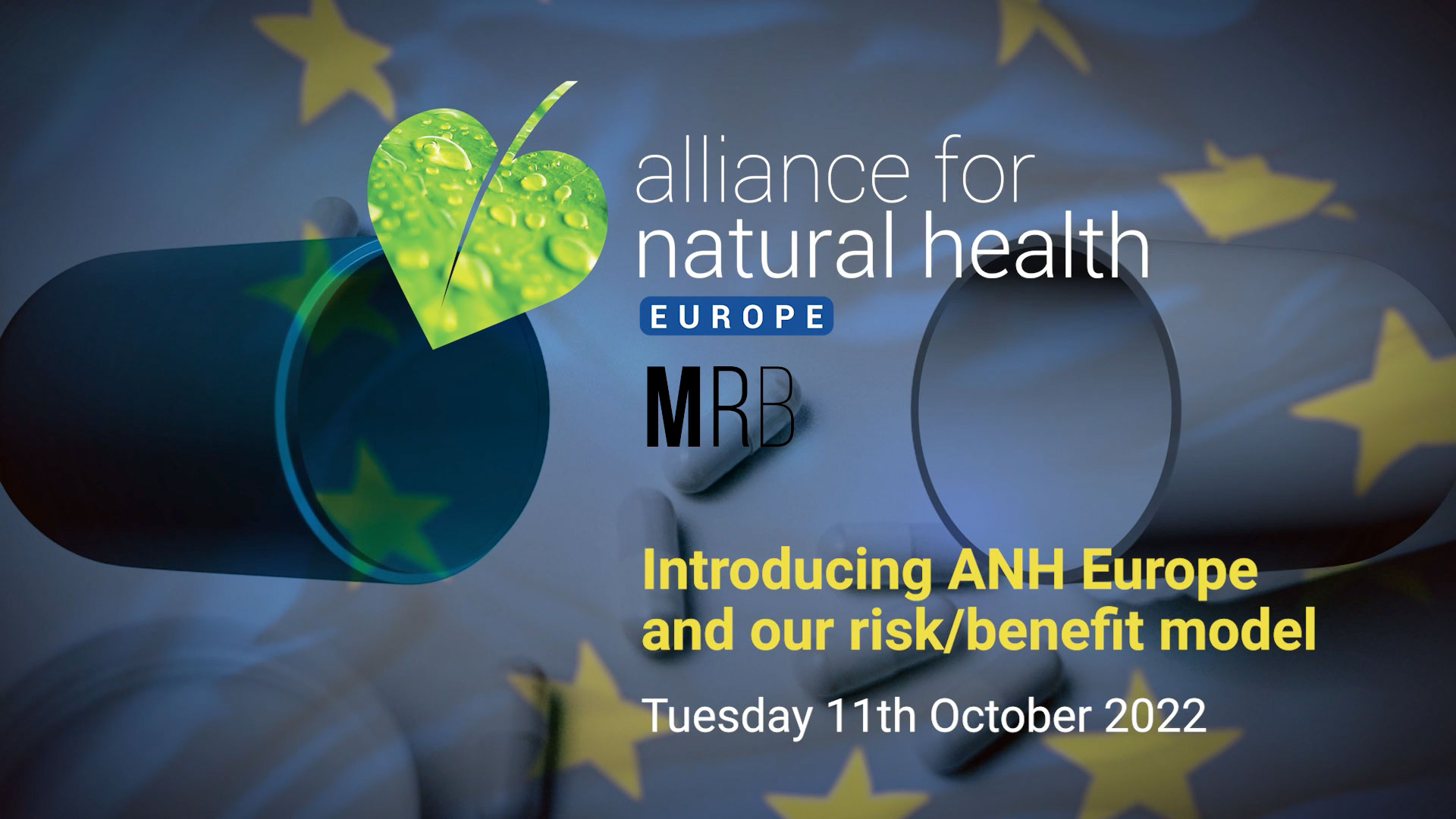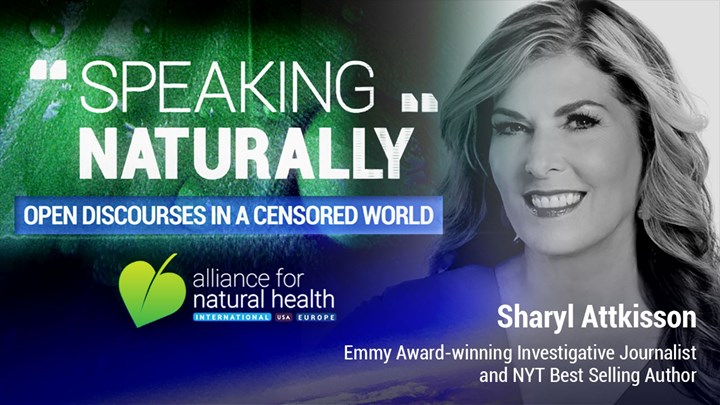Content Sections
By Rob Verkerk, founder, executive & scientific director, Alliance for Natural Health International; scientific director and board member ANH Europe; scientific director and board member, ANH-USA
Are you interested in using food supplements that can actually prevent or treat disease? Do you think EU regulators have acted unfairly and disproportionately to restrict access by nearly half a billion citizens to food supplements?
These are essentially the two questions I used to open yesterday’s webinar that launched ANH Europe to the outside world, and notably those with specific interests in food supplements and natural health. The response in the chat told me we were talking to the right people!
While Dr Jaap Hanekamp from University College Roosevelt and I focused on the new risk/benefit model we have been helping to develop in recent years, the webinar was also a fantastic opportunity to introduce our amazing Amsterdam-based team, including Nick van Ruiten (president of the board), Hein Kleinveld (operations director) and Marga Verspagen (legal counsel) to the outside world.
Game on
For many years the work of ANH International has helped to prevent EU regulators from imposing ‘HARMonised’ levels of vitamins and minerals that will axe all doses that are therapeutic. Among the key strategies we’ve used have been:
- Publishing and disseminating studies (see here and here) that expose the problems of existing regulatory approaches and point to a need for a different, more holistic approach that includes the consideration of 'benefit’
- Petitioning the European Parliament to ensure it is not forced to rubber stamp new laws that restrict dosages unnecessarily. Along with our friends at Health Stores Ireland (formerly the Irish Association of Health Stores, of which I have been scientific advisor for nearly two decades), we successfully petitioned and defended petitions over five years, until the European Commission appeared to lose interest. Sadly, harmonisation is back on the agenda – probably unsurprising given how high dose vitamin D, vitamin C and zinc have played such a key role in helping health-aware people through the covid crisis.
Restricting public access to therapeutic supplements has been the game plan for years, the revolving door between Big Pharma and EU regulators having conspired to supposedly ensure a ‘high level of consumer protection'. This includes apparently protecting us from high dose supplements. Which ones, I hear you ask? That would include trying to stop us taking 20,000 International Units of vitamin D daily (that can generate the equivalent circulating levels of 25-hydroxy-vitamin D as a spell of healthy sunbathing during a northern hemisphere summer), 3 grams of vitamin C a day, 30 mg of zinc, or 100 mg of vitamin B6.
The bottom line is that any proper evaluation of published and clinical evidence will find these levels are not only safe for the vast majority of people, they are also extremely beneficial.
But they don’t want us to have access to these supplements because they compete with drugs, that, courtesy of a broadly scoped definition set in European law (see Article 1.2 in the Human Medicinal Products Directive – latest consolidated version), are the only products that are permitted to have a therapeutic or disease prevention effect on health.

‘Regulatory capture and exclusion’ by EU law: Extract from Directive 2001/83/EC, as amended.
Science has moved on massively, and we now know that nutrition and lifestyle, along with a rash of other social and environmental determinants, are the key factors influencing health and resilience.
That means we need to revisit the whole way in which these regulatory systems have evolved, and we can no longer accept the artificial, Big Pharma-protective regulatory model that has been built over the last half century. This model considers only risk when it comes to micronutrients like vitamins and minerals, ignores any benefits, and precludes any substance or product that treats or prevents disease (i.e. competes with Big Pharma).
Given our base at ANH International is the UK, it is no longer possible for us to lobby the European Commission and the European Parliament in Brussels. We had to set up a continental presence – hence our new Amsterdam base.
Given that we now both have an EU base and our risk/benefit model – the Micronutrient Risk Benefit (MRB) model is now open source - it’s game on!
Check out our 35-minute video explaining the Micronutrient Risk Benefit Model in detail
What next?
We plan to ramp up advocacy in Brussels in the coming weeks and months as the European Commission gets ever closer to harmonising ‘maximum permitted levels’ (MPLs) for vitamin and mineral supplements. This provision gave the Commission authority to tighten this additional regulatory noose when the Food Supplements Directive was passed into European law in 2002 (see latest consolidated version here).
To do this our ANH Europe team needs support from companies who are working in the European Union market – one that is populated by an eye-watering 450 million citizens. A recent survey by the UK-based Health Food Manufacturers Association suggested 71% of the adult population are taking food supplements, almost half doing so on a daily basis. We found a similar proportion in our international analysis of those who had elected not to receive covid-19 injections around the world.
While risk/benefit might be our launch issue at ANH Europe – we will rapidly broaden the remit of ANH Europe to include many of the diverse range of issues that have been our passion at ANH International, that relate to enhancing our health through improving our connection with nature.
Become a change agent
Given the escalation of censorship of information on the use of natural products during these times, and because contributions from businesses will be regarded as tax exempt, we have set up a tiered membership for ANH Europe.
It’s very important to understand that we are not duplicating any of the good work that some natural product trade associations are doing, including the Irish Health Trade Association, Svensk Egenvård (Sweden), NEM in Germany and the European Federation of Associations of Health Product Manufacturers (EHPM).
We’re not re-inventing the wheel! We’re doing the work they can’t or haven’t done – so our work is complementary, not competitive, and aims to benefit the producers and consumers of the most therapeutic and medically useful natural health products.
If you’re manufacturing or selling higher dose vitamins and minerals in the EU market, consider joining ANH Europe or talking with a member of our team after you’ve shared your details and a message on our contact form.
>>> Feel free to republish - just follow our Alliance for Natural Health International Re-publishing Guidelines
>>> If you’re not already signed up for our weekly newsletter, sign up for free now using the SUBSCRIBE button at the top of our website – or better still – become a Pathfinder member and enjoy benefits unique to our members.
Return to Home Page








Comments
your voice counts
14 October 2022 at 10:38 am
Rob Verkerk and Melenie Aldridge have helped me since suffering and recovering from ALS and twin heart attacks three years ago. Undertaking extensive blood tests and DNA analysis, they uncovered some of the causes of my underlying conditions and recommended a significant menu of healthy, nutritious food and supplemental products. Today, I grow an acre full of permaculture vegetables, fruits, herbs, berries and co-existing flowers which provide me and friends with a very healthy diet. My cardiologist (who was severely critical of life without pharmaceutical support) now comments in exasperation: "Whatever you are on, keep it up. Your heart now operates as if in a body twenty years younger than your 75 years."
In the coming years, I hope that these two health professionals are recognized as leaders in the field of good nutritional health. They will jointly deserve the Nobel Prize in Medicine or similar recognition for helping thousands like me to overcome death by supermarket food, Big Pharma and false advertising on labels purporting to sell real food.
My deepest gratitude to them both for pointing the way to a healthy longevity.
14 October 2022 at 3:08 pm
All the most common supplements have proven safety limits so if Europe is going to have harmonisation they should be allowed in all countries up to the limit. 200 mgs for vitamin B6 for example. To say countries can't have supplements that have been proven safe and don't kill people is nonsensical, but I suppose Ursula von der Leyen, being married to the medical director of Orgenesis, a global biotech company committed to 'accelerating commercialization and transforming the delivery of cell and gene therapies', and launching its new cell-based vaccine platform targeting severe acute respiratory syndrome coronavirus 2 (SARS-CoV-2) that causes COVID-19, as well as other viral diseases Zika, West Nile Virus, Yellow Fever, Dengue Fever, MERS, HCV and Cytomegalovirus infection (CMV) etc, well, she's not going to be very happy about competitors, is she?
Your voice counts
We welcome your comments and are very interested in your point of view, but we ask that you keep them relevant to the article, that they be civil and without commercial links. All comments are moderated prior to being published. We reserve the right to edit or not publish comments that we consider abusive or offensive.
There is extra content here from a third party provider. You will be unable to see this content unless you agree to allow Content Cookies. Cookie Preferences